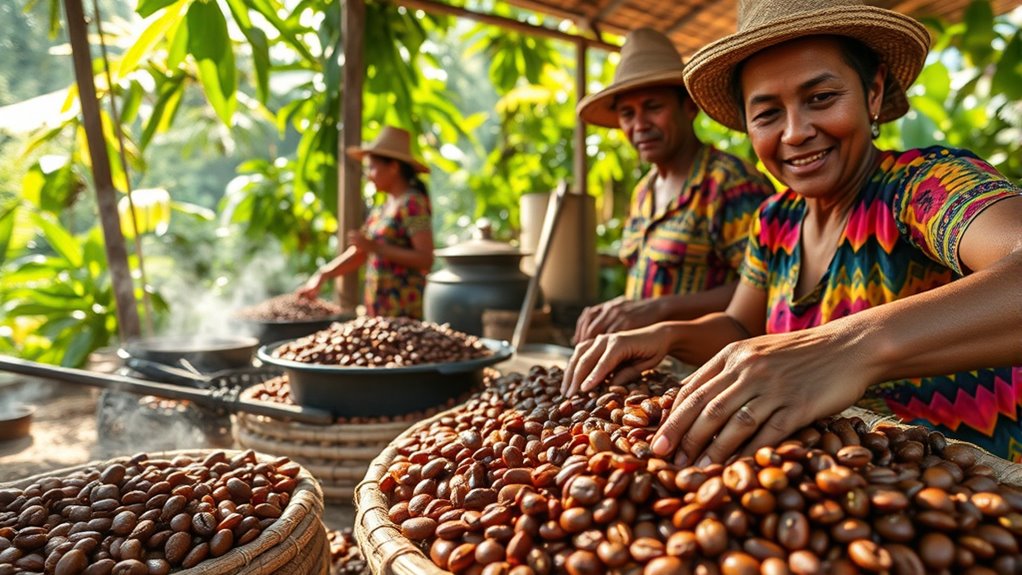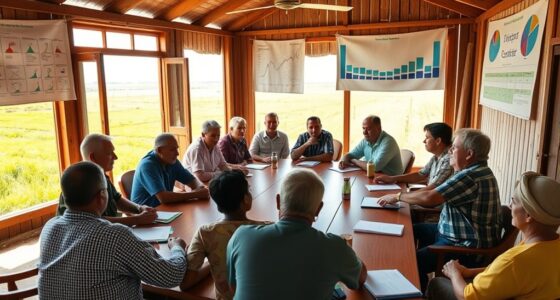The Global South Roasting Movement is changing how coffee from developing regions is valued by emphasizing local processing, branding, and sustainable practices. Instead of exporting raw beans, more origin countries are establishing roasting and processing facilities, capturing greater economic benefits. This shift promotes cultural pride, supports local economies, and boosts the global image of regional coffee. Keep exploring to discover how these efforts are shaping the future of coffee and its rich stories.
Key Takeaways
- Countries are investing in local roasting and processing to retain more value and boost their economies.
- The movement encourages branded, high-quality coffee from the Global South, enhancing regional recognition.
- Origin countries are developing specialty coffee sectors, promoting their unique flavors and cultural heritage.
- Value addition creates new employment opportunities and strengthens local industry infrastructure.
- Increased transparency and traceability build consumer trust and highlight sustainable practices in origin countries.

Have you noticed the rising energy behind the Global South Roasting Movement? This movement isn’t just about roasting coffee; it’s about reclaiming value and reshaping how the world perceives coffee from emerging markets. At its core, the movement emphasizes sustainable farming practices that respect the environment, support local communities, and ensure the longevity of coffee production. By focusing on sustainable farming, producers are shifting away from harmful methods and embracing techniques that maintain soil health, conserve water, and promote biodiversity. This shift isn’t just good for the planet—it also results in higher-quality beans, which provide a stronger foundation for local economies. When farmers adopt sustainable practices, they experience better yields and more resilient crops, giving them the confidence to invest further in their land and communities.
The Global South Roasting Movement champions sustainable farming, empowering communities and elevating coffee quality and cultural pride.
As the movement gains momentum, you’ll see a significant transformation in coffee culture. No longer is coffee just a commodity; it’s becoming a symbol of local pride and cultural identity. Roasters and consumers alike are increasingly interested in the story behind each cup—where it comes from, how it was grown, and who benefited from its production. This shift encourages a deeper appreciation of the unique flavors and profiles that originate from different regions in the Global South, fostering a richer coffee culture that celebrates diversity and tradition. You might notice more emphasis on traceability and transparency, with brands highlighting the origins of their beans and the sustainable practices employed. This transparency helps foster trust and builds a direct connection between consumers and farmers.
The movement also promotes the idea of value addition within the origin countries, which is a game-changer. Instead of exporting raw beans, countries in the Global South are increasingly investing in local roasting facilities, processing plants, and branding efforts. This not only boosts local economies but also allows countries to capture more of the value chain. As a result, you’ll find a growing number of specialty roasters rooted in these regions, offering unique, locally crafted flavors that reflect their cultural heritage. This shift encourages a more equitable distribution of profits and helps elevate the status of coffee from these nations on the global stage. Additionally, advancements in projector technology are enhancing the visual experience for coffee enthusiasts, allowing for immersive tastings and virtual presentations of coffee origins.
In essence, the Global South Roasting Movement is transforming how coffee is produced, consumed, and celebrated. It’s about more than just coffee beans; it’s about empowering communities through sustainable farming and redefining coffee culture to honor local traditions and innovations. As this movement continues to grow, you’ll likely see a deeper connection between you and the origins of your coffee, making each cup a story of resilience, sustainability, and cultural pride.
Frequently Asked Questions
How Does Value Addition Impact Local Economies?
Value addition boosts local economies by creating new jobs and increasing income, which supports economic diversification. When you focus on processing and roasting locally, you empower communities by providing them with skills and opportunities that keep wealth within the region. This not only strengthens the economy but also fosters community empowerment, encouraging sustainable growth and reducing reliance on raw exports. Your involvement in value addition helps build resilient, self-sufficient local markets.
What Are the Environmental Effects of Roasting in the Global South?
You contribute to environmental sustainability by adopting eco-friendly roasting practices, which reduce emissions and waste. However, if you don’t prioritize climate adaptation, roasting can lead to deforestation, water pollution, and increased carbon footprints. To minimize these effects, you should implement sustainable energy sources and waste management strategies. This not only helps protect local ecosystems but also supports long-term climate resilience in your community.
How Can Small-Scale Roasters Access International Markets?
You can access international markets by developing strong branding strategies that highlight your unique story and commitment to quality. Use sustainable packaging to appeal to eco-conscious consumers and differentiate your products. Leverage online platforms and participate in international coffee expos to build networks. Collaborate with importers and distributors who prioritize ethical practices. These steps help you establish credibility, expand your reach, and tap into global demand for ethically sourced, high-quality coffee.
What Training Is Available for Local Coffee Farmers?
You can access training through local agricultural extension services, NGOs, and cooperatives that focus on farmer education. These programs teach crop diversification techniques, sustainable farming practices, and quality improvement methods. Attending workshops or participating in farmer field schools helps you gain practical skills and knowledge. Some programs also offer certifications, which can boost your market access and bargaining power. Staying connected with local agricultural agencies guarantees you get ongoing support and updates.
How Does the Movement Influence Fair Trade Practices?
You see how the movement boosts fair trade practices by encouraging ethical sourcing and local value addition. For example, in Ethiopia, farmers who participate in the movement gain access to fair trade certification, ensuring they receive fair prices. This promotes transparency and equity, empowering farmers to invest in sustainable practices. The movement’s focus on origin-country value addition strengthens fair trade by fostering local economic growth and ensuring ethical sourcing standards are met.
Conclusion
So, here you are, championing the Global South’s roasting movement, thinking you’re shifting power back to origin countries. Ironically, as you add value locally, you might just be fueling global demand for their beans—keeping the cycle alive. Instead of breaking free from the global coffee chain, you’re unwittingly tightening it. Sometimes, the biggest change is realizing that, in the end, everyone’s still just chasing that perfect cup.









